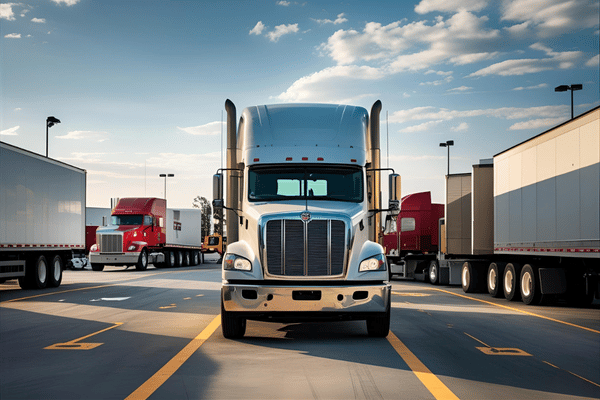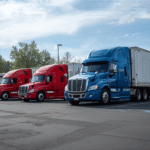

Why Reliable Truck Parking Is Crucial for Drivers, Fleets, and the Entire Supply Chain
A truck without a parking space is a problem waiting to happen.
Every hour a driver spends searching for parking drains fuel, disrupts schedules, increases safety risks, and puts pressure on the entire logistics system. Reliable truck parking is not just about convenience. It’s a core function of modern freight efficiency, and when overlooked, the consequences are costly-for drivers, fleet managers, lot owners, and the economy as a whole.
Here’s why consistent, secure, and well-managed truck parking is more critical than ever.
Drivers Can’t Do Their Jobs Without It
Truck drivers operate under tight regulations, most notably the Hours of Service (HOS) rules. These guidelines limit how long a driver can stay on the road before taking mandatory rest. Without reliable parking, those rest breaks become a gamble.
Thousands of drivers are forced to park in unsafe, unauthorized, or illegal spots every night, putting themselves, their cargo, and others at risk. Common issues include:
- Tickets and towing fees
- Cargo theft and vandalism
- Driver fatigue
- HOS violations leading to fines
- Limited access to restrooms, showers, or meals
Truck parking is not a luxury. It’s a compliance requirement, a safety issue, and a basic need that directly affects a driver’s mental health, job satisfaction, and performance.
Fleet Efficiency Depends on Predictable Stops
Every wasted minute searching for a parking spot costs money. For fleet operators, those minutes multiply across dozens or hundreds of trucks daily.
Reliable truck parking enables:
- Smarter route planning with defined rest breaks
- On-time deliveries by reducing unexpected delays
- Improved driver retention by reducing stress and burnout
- Lower fuel costs by cutting down circling and idling
- Fewer HOS violations and associated penalties
Without consistent parking access, fleet managers can’t optimize delivery windows, and dispatchers face constant rescheduling headaches. What should be a routine rest stop becomes a logistics puzzle.
The Supply Chain Feels Every Delay
Truck parking is more than just a driver or fleet problem. It’s a critical link in the supply chain.
When drivers can’t park:
- Deliveries arrive late, affecting production, inventory, and retail timelines
- Warehouses experience backlogs from missed dock appointments
- Customer service teams handle more complaints
- Retailers lose sales due to stockouts
- Shippers pay more due to demurrage, detention, and rescheduling fees
Efficient parking solutions support the entire chain, from the manufacturer to the last-mile delivery partner.
Public Infrastructure Can’t Keep Up
The number of trucks on the road continues to grow, driven by e-commerce, faster shipping expectations, and increased freight volume. But public rest areas and private truck stops haven’t expanded at the same rate.
The result? A parking deficit.
According to the American Trucking Associations, for every 11 drivers on the road, there’s only one available truck parking spot. Many rest areas fill up by early evening, forcing drivers to stop short of their target destination or risk parking illegally.
The solution lies in smarter infrastructure, and for now, that means leveraging technology and private parking networks to fill the gaps.
Reliable Parking = Reliable Security
Parking in a random empty lot might work for cars-but not for 80,000-lb trucks carrying valuable freight.
Secure, managed parking locations protect drivers and assets by offering:
- Fenced perimeters and controlled gate access
- Security cameras and surveillance
- Lighting and emergency contact systems
- License Plate Recognition (LPR) and entry logs
- Verified access only for registered vehicles
For fleet owners, this reduces the risk of cargo loss, insurance claims, and driver injury. For drivers, it offers peace of mind when they need it most-during rest.
Technology Makes Parking Smarter, Safer, and Simpler
Apps and digital platforms like Find Truck Parking are transforming how truck parking is found, booked, and managed.
Key features of modern parking platforms include:
- Real-time space availability based on GPS or sensor data
- Mobile booking and reservations to secure a spot in advance
- Digital payments with receipts and billing integration
- Route-based suggestions to align parking with delivery schedules
- Access control systems for secure entry and exit
- Fleet dashboards for dispatch visibility and planning
Reliable parking isn’t just physical space anymore. It’s a digital service layer that connects drivers to safety, speed, and predictability.
Lot Owners Can Meet Demand-and Monetize It
The truck parking shortage presents a huge opportunity for landowners and parking operators.
By converting vacant land, commercial property, or underused lots into designated truck parking facilities, property owners can:
- Generate passive income through hourly or monthly rentals
- Use platforms like FindTruckParking to automate booking and payments
- Reach thousands of drivers with real-time listings
- Install low-cost security features to increase attractiveness
- Contribute to solving one of logistics’ biggest pain points
With minimal startup costs and growing demand, truck parking is fast becoming one of the most underserved and profitable real estate sectors in the logistics economy.
The Future Depends on Scalable Parking Solutions
As urban delivery increases, autonomous freight vehicles become a reality, and environmental regulations tighten, truck parking will evolve.
We’re already seeing early trends like:
- Multi-use freight hubs combining rest, refueling, and charging
- Dynamic pricing for peak vs. off-peak parking
- Green lot design with EV chargers and solar lighting
- AI-driven recommendations based on traffic, HOS, and weather
- Nationwide parking databases for better infrastructure planning
Reliable truck parking is no longer about just finding a space-it’s about building a logistics ecosystem that’s scalable, efficient, and ready for tomorrow.
Conclusion: Reliability Starts with Where You Stop
Every delivery starts with a driver-and every driver needs a place to rest. When parking is predictable, the whole system flows smoother. When it’s unreliable, everything slows down.
- Drivers stay safe, compliant, and rested
- Fleets reduce costs and stay on schedule
- Shippers move product with confidence
- The economy keeps rolling
Reliable truck parking isn’t a side issue-it’s a core part of logistics success.
Add a comment Cancel reply
Categories
- news (2)
- parking (6)
- truck-parking (5)
- Uncategorized (13)
Recent Posts
Popular Tags
Related posts


The Growing Truck Parking Shortage: What It Means for Drivers and Supply Chains

How to Find Safe and Legal Truck Parking in High-Demand Areas







